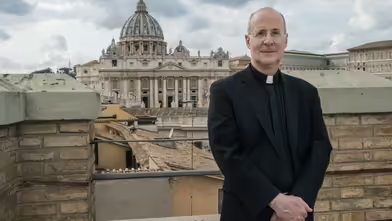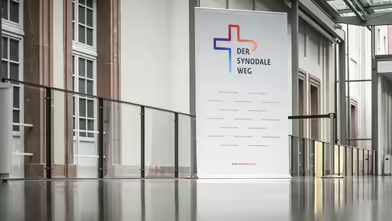Hier geht's zur deutschen Version des Interviews!
DOMRADIO.DE: This is a synod like no other. People are sitting in circles, bishops, priests, religious or laypeople together. How does everyday life look like inside the synod hall?
James Martin SJ (Jesuit and Author): Everyday life is quite pleasant in the Synod Hall. Last year I think people were a bit more cautious, since, except for those delegates who worked in Rome, very few of us knew one another. But on the first day of the Synod this year there was a great deal of hugging and laughing as people greeted not just fellow delegates, and not just brothers and sisters in Christ, but real friends.
DOMRADIO:DE: How do you experience synodality in this case?
Martin: Synodality is really about deep listening. Now that may sound rather vague, so let me be more specific. It means listening--without interrupting--to people from very different backgrounds and perspectives, from around the world, to hear where the Holy Spirit is at work in their lives. At my current table, for example, I'm seated in between someone from Tanzania and Fiji. Their countries and cultures and ways of being Catholic will naturally be quite different. So I must "meet them where they are," as we say. And that starts with listening.
DOMRADIO.DE: I remember your photo with Cardinal Müller last year. Can you tell us the story behind it – and did you two have any contact in the meantime?
Martin: Last year, I was happy to meet Cardinal Müller, whose writings and scholarship I admire, even though we may not agree on every single topic. I was especially inspired by his work with Gustavo Gutierrez, the liberation theologian. Cardinal Müller, I knew, had worked and studied under Fr. Gutierrez, and had also spent time working in Peru. So we chatted and, without breaking confidence, I will say that we agreed to exchange books. He gave me one of his, which I enjoyed very much, and I gave him my book on Jesus. I've not had the chance to greet him yet this year, but I hope to.
DOMRADIO.DE: Many LGBTQ-people around the world are looking towards you to make their voices heard in the synod. How do you feel with this responsibility?
Martin: I'm certainly not the only delegate who ministers with LGBTQ people. Many delegates, particularly those who work in parishes, have had experience with this type of outreach. And many bishops have asked advice on ministering to this community. So I don't feel it as a burden. At the same time, I feel a sense of responsibility to, in a sense, share the voices of LGBTQ people during the Synod.
DOMRADIO.DE: Do you expect any concrete changes on the way the church is behaving towards people with with a different sexual identity?
Martin: That's a good question. And I can answer it two ways. If by "the church" you mean the Synod, we have to remember that the issue of LGBTQ people is being studied by one of the "study groups," not the Synod in general. So I doubt that this session will say anything noteworthy on this topic, mainly because we are focusing more on synodality in general, then any one topic. But if by "the church" you mean the whole church, I have already seen concrete changes. The publication of the document "Fiducia supplicans," which permits the blessing of same-sex couples under certain circumstances is a huge change, which I doubt people could have predicted even 10 years ago.
DOMRADIO.DE: What do you hope for at the end of the month? Many people are disappointed, that hot button issues like the role of women have been stricken off the agenda and given into seperate working gorups.
Martin: My hope is that the Synod will come up with concrete steps to help the Holy Father in his desire to make the church more of a "listening" church. That is, I hope that we offer not only the theological basis for synodality, as we have in the past, but also offer some real, practical and even obligatory steps for parishes and dioceses--which is to say the whole church--move towards greater and greater listening, which will inevitably lead to a more compassionate, more welcoming and, in the end, more faithful church.
The interview was conducted by Renardo Schlegelmilch.



